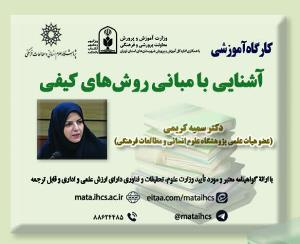تبیین مفهوم قرآنی «املاق» با روش ریشه شناسی در منابع زبانهای سامی (مقاله علمی وزارت علوم)
درجه علمی: نشریه علمی (وزارت علوم)
آرشیو
چکیده
واژه املاق، تنها در دو آیه از قرآن و به عنوان یکی از دلایل فرزندکشی معرفی شده است که مفسران معمولاً آن را فقر معنا کردند. کاربست روش ریشه شناسی تاریخی افق جدیدی از هسته معنایی و مراد قرآنی واژه املاق و دریافت پیام کلی آیات قرآن برای ما باز می کند. ریشه ملق در زبان عربی، چهار معنای مشابه با سایر زبان های سامی دارد که یافته های ما نشان دادند برخی از این معانی بر اثر اشتقاق معنایی از دیگر ریشه های مشابه شکل گرفتند. معانی طلب خروج و مسطح کردن حاصل ورود معانی ریشه های مشابه مانند ملخ و ملص به ریشه ملق هستند. به نظر می رسد معنای دوستی و حبّ شدیدی که منجر به عشق یا پرستش شود، معنای اصلی ملق است که معنای ثانویه انفاق و نداری بر اثر این پرستش یعنی فقر، در زبان عربی برای ملق شکل گرفته و رایج شده است. همچنین، املاق در زبان تیگرینیا، یکی از زیرشاخه های زبان حبشی، به معنای خدای دروغین است که در دیگر زبان های سامی مانند عبری، اکدی و عربی جنوبی به «املاک» به معنای الهه یا ایزدبانو و پادشاه، تبدیل شده است. در کتاب مقدس نیز از بتی به نام «ملکوم» یا «مولک» یا «مولوخ» یاد می شود که برای آن فرزندان را قربانی می کردند. در تمدن های باستانی عصر برنز، این خدا مورد پرستش بوده و کودکان خردسال برای آن سوزانده می شدند؛ بنابراین، هسته معنایی املاق از ریشه ملق به معنای دوستی و محبت شدید ناشی از پرستش بت املاق، شکل گرفته است و مفسران معنای عارضی فقر را برای آن ذکر کردند.Clarifying the Quranic concept of "Imlaq" with the method of etymology in Semitic languages sources
The word Imlaq is introduced in only two verses of the Qur'an as one of the reasons for infanticide. The application of the etymology method can be helpful to reach the semantic core of the word Imlaq and to receive the message of the Quranic verses. The root of "Malaq" in the Arabic language has four meanings similar to other Semitic languages; First, intense friendship and love, second, the meaning of loving leading to poverty, which can be said that the fame of the meaning of Imlaq to poverty is derived from the second meaning. The third and fourth meanings indicate the desire to leave and straighten, respectively, and are the result of entering the meanings of similar roots such as malakh and malas to the root of malaq. Imlaq in the Tigrinya language means a false god, which in other Semitic languages such as Hebrew, Akkadian, and South Arabic has become "amlak" meaning goddess and king. Amlak is derived from the name of a false god named "Malcum", "Molek" or "molukh" in the Bible, which was worshiped in many ancient civilizations, and young children were sacrificed to it. Therefore, the semantic core of Imlaq was formed from the root of Malaq, which means extreme friendship and affection resulting from the worship of the idol of Imlaq, and gradually evolved into the meaning of poverty.
Imlaq ,Molek ,Etymology ,Child Sacrificing ,Semitic languages,







